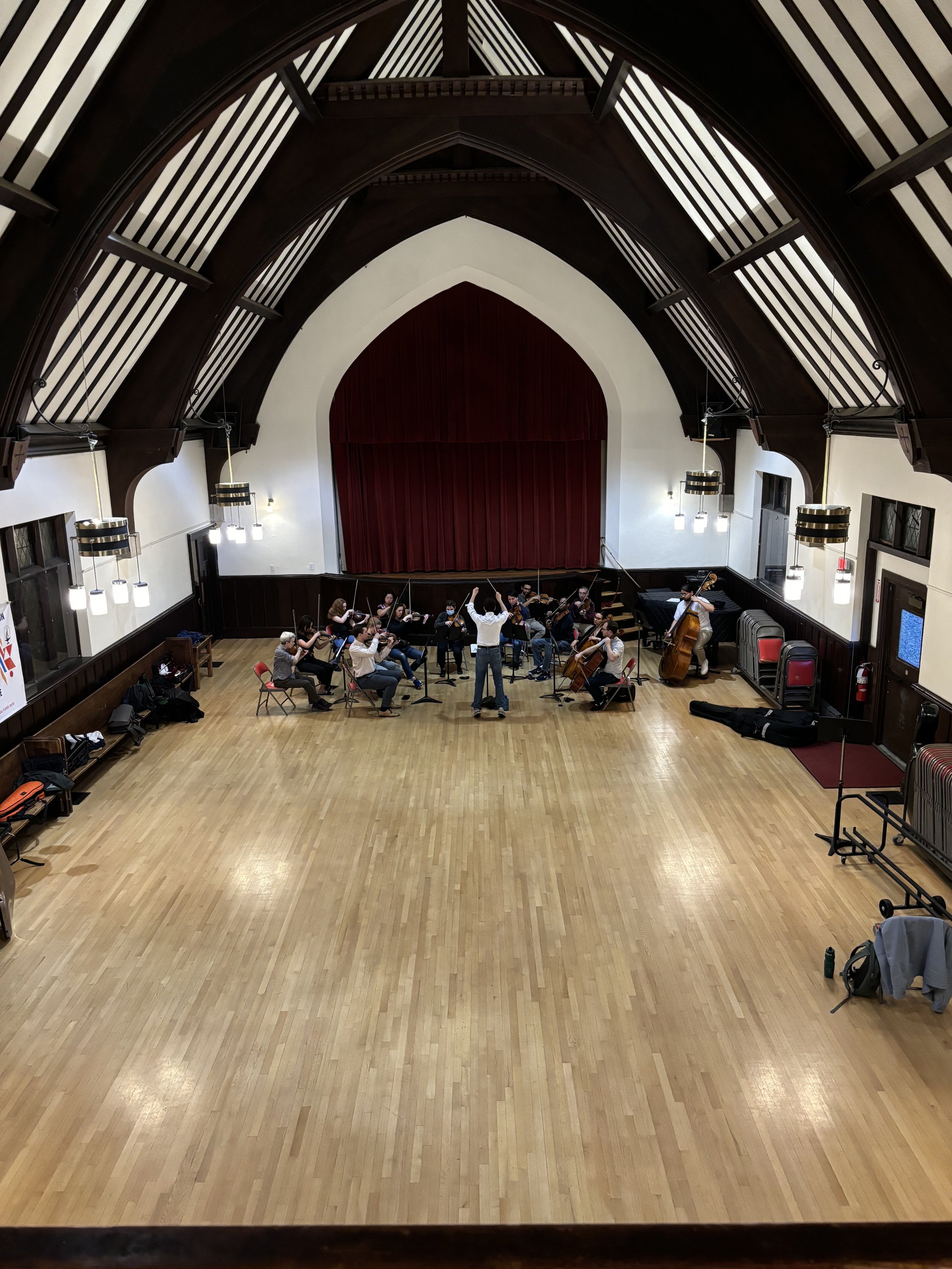
Read more about our upcoming concert in the Boston Musical Intelligencer: https://www.classical-scene.com/2024/05/09/crossing-genre/
The Orchestra Without Borders returns to the stage on May 18th at the First Unitarian Society in Newton for a concert aimed at building bridges across continents and musical styles. The performance features soprano Hannah Shanefield in Odaline de la Martinez’s rarely-performed “Four Afro-Cuban Songs,” a tribute to the humor and heart of Afro-Cuban culture, alongside a set of music from the Middle East, including a suite of Afghan songs by Boston-based Afghan composer Arson Fahim. These works will be presented in dialogue with jazz compositions by the acclaimed saxophone and piano duo of Jonathan Fagan and Michael Rosen. Together, jazz and classical ensembles forge a path across musical boundaries and diverse folk traditions, culminating in a performance of American composer Adolphus Hailstork’s contemplative work for strings, the Sonata da Chiesa. The concert was inspired by – and will be accompanied by – an art show whose proceeds benefit Communities Without Borders, a group known for its humanitarian work in Zambia.
Conductor Luca Antonucci sat down with both Fagan and Shanefield to discuss the appeal and the challenges of the unusual program, which aims to create a concert experience that opens new avenues to facets of classical music rarely encountered in the concert hall.
LA: I’ve known both of you for a while, and I’m really looking forward to collaborating again on this concert! What got you interested in this project?
JF: I was interested in both the theme and presentation of this concert-you put together an exciting program with good musicians, and I’ve seen you direct before so I know it’s going to be fun. I studied classical piano seriously in college, and since then I've done a fair amount of classical accompanying but I haven't done anything with a bigger ensemble, so I'm excited to explore the possibilities. It's always been something I've wanted to do more, especially as I compose more pieces that blur the lines between genres.
HS: The realm of classical music is closely tied with European tradition. While that music is wonderful, there is obviously the whole rest of the world to consider! The opportunity to delve into music from underrepresented parts of the world is special and rare. As a self-professed music nerd, I'm loving learning about these composers [Martinez, Fahim, and Levantine composer Mahdi AlMahdi] and familiarizing myself with their musical worlds.
LA: This program contains some unusual music that draws on different musical styles. One piece is based on traditional Middle-Eastern improvisation, and in another, the singer is even asked to use a very specific Cuban-Spanish dialect. Describe some of the challenges in working on this repertoire.
HS: Unfortunately, Spanish vocal repertoire is not programmed very frequently. So, although I'm familiar with Spanish, I don't have a lot of experience singing in the language. Singing words takes a lot more time than speaking them -- you're essentially speaking in slow motion -- so a detailed analysis of pronunciation is required. Fortunately, poet Nicólas Guillén transcribes many aspects of this into the text of the poems themselves (e.g. "etoy" rather than "estoy"). Additionally, the Internet and my Spanish-speaking partner are wonderful resources for me.
JF: For me, the most interesting aspect and the biggest challenge of this project is going to be improvising with unfamiliar folk traditions. Fusing genres requires some very specific knowledge and immersion in the vocabularies and styles of the composers we'll be referencing. Those are the projects where I grow the most though, so I'm looking forward to stretching myself there.
LA: Jonathan, tell me about your collaboration with saxophonist Michael Rosen.
JF: Interestingly, we found each other by chance through mutual contacts in advance of a birthday concert he was doing for his mother. He's a superb player and we got along right away. When he mentioned he was in town again in May (he lives in Italy), he struck me as an ideal collaborator for this project since his projects include a classical aesthetic and arrangements of folk tunes. So I'm very excited to see what he does with this material; it's the right blend of influences for both of us.
Join Jonathan Fagan, Hannah Shanefield, and the Orchestra Without Borders on May 18th at 7:30 at the First Unitarian Society in Newton. Free admission.
Orchestra Without Borders Boston is an inclusive ensemble whose mission is to present music by composers from historically marginalized groups in benefit concerts to support justice, equity, and dignity for all members of the Greater Boston community. Orchestra Without Borders Boston is a project of the Open Door Ensembles of Boston, Inc.
Find us on facebook here.
OWB Musicians and Alumni include freelance professional musicians, conservatory students, and amateurs, united in the objective of presenting high-quality concerts of music by composers from underrepresented backgrounds in classical music.
Past and current repertoire includes music by Coleridge-Taylor, Esmail, Komitas, Montgomery, Sowande, Still, Shaw, and Saint-Georges
Orchestra Without Borders is supported by the Massachussetts Cultural Council.
We are proud to participate in the Card to Culture program, a collaboration between Mass Cultural Council and the Department of Transitional Assistance, the Women, Infants & Children (WIC) Nutrition Program, and the Massachusetts Health Connector, by broadening accessibility to cultural programming.
EBT, WIC, and ConnectorCare cardholders are entitled to free admission. Follow the links to see the complete list of participating organizations offering EBT, WIC, and ConnectorCare discounts.
Watch extracts of our March 2022 performance, “Trade Winds” here!


































